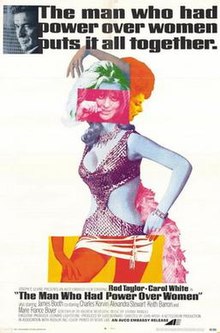The Man Who Had Power Over Women
| The Man Who Had Power Over Women | |
|---|---|
 | |
| Directed by | John Krish |
| Written by | Chris Bryant Allan Scott |
| Produced by | Judd Bernard |
| Starring | |
| Cinematography | Gerry Turpin |
| Edited by | Thom Noble |
| Music by | Johnny Mandel |
Production company | |
| Distributed by | AVCO Embassy |
Release date |
|
Running time | 89 minutes |
| Country | United Kingdom |
| Language | English |
| Box office | $11,400 (US)[1] |
The Man Who Had Power Over Women is a 1970 British comedy film directed by John Krish and starring Rod Taylor, Carol White and James Booth.[2] A successful talent agent grows disenchanted with his life and begins an affair with his best friend's wife.
Plot
[edit]Peter Reaney is a successful public relations executive, managing pop singer Barry Black, a difficult client. Peter's neglected wife Angela leaves him, taking most of their money, and he begins an affair with Jody, the wife of his best friend Val.
Peter finds out that Black has made a fan called Mary Gray pregnant, and is shocked that his agency is arranging a clandestine abortion.
When Jody and Peter go to see Val to tell him of their affair, they find Val in bed with Jody's friend Francis. The next day, Val is killed in an accident. Jody and Peter decide to stay together.
Peter learns that Mary has died. He resigns from his job and assaults Black in front of a crowd of his fans.
Cast
[edit]- Rod Taylor as Peter Reaney
- Carol White as Jody Pringle
- James Booth as Val Pringle
- Penelope Horner as Angela Reaney
- Charles Korvin as Alfred Felix
- Alexandra Stewart as Frances
- Keith Barron as Jake Braid
- Clive Francis as Barry Black
- Marie-France Boyer as Maggie
- Magali Noël as Mrs Franchetti
- Geraldine Moffat as Lydia Blake
- Wendy Hamilton as Mary Gray
- Ellis Dale as Norman
- Philip Stone as Angela's father
- Matthew Booth as Mark Pringle
- Sara Booth as Sarah Pringle
- Virginia Clay as Mrs Pringle
- Jimmy Jewel as Mr Pringle
- Diana Chance as stripper
- Patrick Durkin as Herbie
- Paul Farrell as Reaney's father
- Geoffrey Hughes as policeman
- Valerie Leon as Glenda
- Ruth Trouncer as Mrs Gray
- Jacki Piper as receptionist
Production
[edit]The original director was Silvio Narizzano who left the project prior to shooting. Unhappy with subsequent changes, screenwriters Chris Bryant and Allan Scott requested their names be removed from the film.[3]
Critical reception
[edit]The Monthly Film Bulletin wrote: "A straightforward, not to say inanely obvious and sentimental message seems to underlie this story of the spiritual guilt and cowardice bred by commercial compromise. Everything in the development of the film ... solidly emphasises the moral lesson. Perhaps because the film's centre seems such a heavy platitude, some vestige of interest only begins to develop, by simple opposition, on the periphery. The title is the first incongruous note: there is not a male in the film to whom it could apply. The only positive quality of the two characters caught in a world they both despise is their friendship, on the level of drunken pranks, mock-homosexual badinage and obvious affection. But once the solemn affair with Jody begins, this amusing interplay disappears – only surfacing in such odd sick jokes as Val's death under a deluge of lavatory bowls and the line in his will bequeathing his love to Reaney and his body to "science or the glue factory". The theme is finally never more than half alive, with a tawdry existence in the margins of a superficial film."[4]
The Radio Times Guide to Films gave the film 1/5 stars, writing: "This awful, cringe-inducing story about a public relations executive and his obnoxious pop star client was filmed at the fag end of the Swinging Sixties, and it has dated very badly. Although the film toys around with the moral issue of abortion, it never achieves more than a glossy vacuity."[5]
British film critic Leslie Halliwell said: "Fashionable wallow in guilt and luxury, not very convincingly done."[6]
References
[edit]- ^ Vagg p. 151
- ^ "The Man Who Had Power Over Women". British Film Institute Collections Search. Retrieved 4 February 2024.
- ^ Stephen Vagg, Rod Taylor: An Aussie in Hollywood, Bear Manor Media, 2010, p. 149, ISBN 978-1629330419
- ^ "The Man Who Had Power Over Women". The Monthly Film Bulletin. 37 (432): 228. 1 January 1970 – via ProQuest.
- ^ Radio Times Guide to Films (18th ed.). London: Immediate Media Company. 2017. p. 586. ISBN 9780992936440.
- ^ Halliwell, Leslie (1989). Halliwell's Film Guide (7th ed.). London: Paladin. p. 649. ISBN 0586088946.
